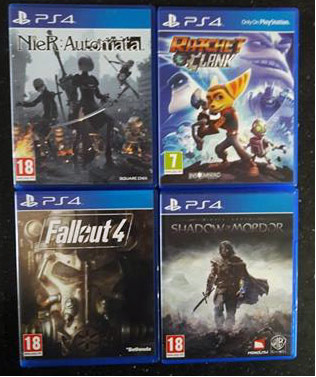
by John | Apr 13, 2018 | Writing Insights
Jamie White continues his thoughts on writing for video games. This time it’s all about the difficulties of writing open world games…
 Up until now the games I’ve talked about have had a very linear narrative structure. The gamer doesn’t really have that much control of where the character goes or what they can do. That’s all about to change as we look into what is possibly my favorite genre of game – open world sandbox RPGs.
Up until now the games I’ve talked about have had a very linear narrative structure. The gamer doesn’t really have that much control of where the character goes or what they can do. That’s all about to change as we look into what is possibly my favorite genre of game – open world sandbox RPGs.
OK, it can be a bit of a mouthful, but these types of games (which I’ll just refer to as sandbox games) are usually the most immersive. They offer the player a variety of options within an open world setting – you can create your own character from scratch sometimes, mix and match weapons, and perhaps most importantly, nail your outfit. That might sound kinda silly, but giving the player that little bit of control allows them to put some of their personality into the character.
So why are they called sandbox games? Well, as always, Wikipedia puts it best…
“A game in which the player has been freed from traditional video game structure and direction, and instead chooses what, when, and how they want to approach the available content. The term alludes to a child’s sandbox without rules, with play based on open-ended choice. While some sandbox games may include building and creative activities, they are not required. Sandbox games generally employ an open world setting to facilitate the player’s freedom of choice.” – https://en.wikipedia.org/wiki/Glossary_of_video_game_terms#osandboxgames
So, in short, you can do whatever you like with sandbox games – as long as you stay inside the sandbox and only use the sand and really cool customizable plastic shovels.

A collection of various sandbox games.
I also mostly find that these games have some of the best storylines. Whether it’s the more recent Horizon: Zero Dawn or Nier: Automata, or classics of years gone by like Red Dead Redemption or GTA: San Andreas. The big issue for writers when writing for these types of games, though, is side quests.
Think of side quest as sub-plots. Some are more related to the main plot than others, while some are simply hunting and/or gathering missions. What they should always be, though, is interesting. The escort side mission has become the bane of many gamers’ existence (it’s just so damn annoying!) and finding specific artifacts or plants to complete a quest is just super tedious and unimaginative. These types of missions can add some needed variation to side quests, but finding several unique ways to handle them can be a tough task for writers.
An even tougher task is how the hell you actually write these types of games. And much like the narrative focused games I looked at in my previous article, there isn’t a set way. You gotta go with whatever makes sense to you. But, I do have a suggestion.
Sandbox games are comprised of, essentially, two plot arcs: A) The main story and B) the side quests. Sometimes these side quests only become available after you’ve reached a certain point in the main story, or after you’ve unlocked a certain weapon, or whatever, so how can you writer both into one document?
Well, you’re familiar with those “Choose Your Own Adventure“ novels, right? The ones that say “Turn to page 36 to follow the dragon”, then you turn to page 36, get killed by the dragon and quickly turn back to the previous page. Well, I think you could follow a similar sort of format.
Start out writing the main plot as you would a regular script. Then, when you get to a place where you think “hey, I can add a side quest here”, make a note like “SIDE QUEST “A side quest served cold” now available. Turn to page 124 for narrative”, then carry on with the main plot. You could either then finish the main storyline before adding the side quests, or add them as you go.
Again, it’s best to do it however you feel comfortable. While there’s strict format for screenplays, that is not really the case for video game writing.
 Most importantly, though, especially for new video game writers – stick to writing the main plot. Don’t take the Skyrim route that has several big plotlines and what feels like millions of side quests. It can be exhausting to play, so I can only imagine how it would be to write…
Most importantly, though, especially for new video game writers – stick to writing the main plot. Don’t take the Skyrim route that has several big plotlines and what feels like millions of side quests. It can be exhausting to play, so I can only imagine how it would be to write…
If you wanna write your own video game script and enter it in our Spring Contest (we allow video game scripts now!) but aren’t quite sure on how to approach it, just get in touch! Maybe we can end up doing a Q&A sorta thing…? We’ll see!
I wanna also talk about why you film and TV writers should not look to adapt video games into mainstream consumptive media, but that’s an article for another day…

by John | Apr 4, 2018 | Writing Insights
With the recent arrival of a new Elite Mentor joining the team (one who specializes in video games), Jamie White continues his look at how you can be successful at writing for video games.
 After looking at the linear narrative to the Call of Duty games last time, I thought the next step would naturally be to look at games with an over-arching narrative, but with hundreds, maybe thousands, of variations and combinations.
After looking at the linear narrative to the Call of Duty games last time, I thought the next step would naturally be to look at games with an over-arching narrative, but with hundreds, maybe thousands, of variations and combinations.
For me, the story is almost always more important than gameplay. Of course, there are various examples where it’s the other way around (looking at you Bloodborne) but the story and characters are the most important thing in video games, as they should be for any medium.
And so, that’s why I love TellTale games, Life is Strange and Heavy Rain. These games can be played by any kind of noob, by a child, or even your dog. These types of games mostly rely on you just pressing buttons to choose one of four dialogue options or performing “Quick Time Events”. I’d hesitate to even call them games – more like… interactive movies. And you know what? That’s fine with me.
But these types of games are much more difficult to write than the linear narrative of Call of Duty or the Injustice games. Looking primarily at TellTale, they employ an episodic format for their game releases. So, The Wolf Among Us will have 5 episodes, or their Game of Thrones game will have 6 episodes, which are released every 2-3 months. But the seemingly impossible task comes from the amount of choice you have within these games. Choosing from 4 dialogue options is no exaggeration, and there will be a LOT of conversations throughout the game – sometimes they force you to make a choice (to kill one guy or another, to burn a magical tree or not).
The secret with these type of games, though, is the choices and dialogue options don’t really matter. They give the player the “illusion of choice”. So, you can easily write the basic outline of the plot, then go back in and decide where you want to have multiple dialogue options. Go back and write in a QTE as you would an action scene – but remember, the player can mess these up, so you’ll need at least two outcomes for each action the player does (or fails to do).
Check out this video to the opening of TellTale’s The Wolf Among Us. This is the very first thing the player does. It’s a great intro to both the series, the game, and the game type.
Just a warning there is some violence, swearing, and a talking frog in this video. So, you’ve been warned.
I chose The Wolf Among Us for a couple of reasons. A). I love it. I love the story, the concept, the tone, the themes. It’s brilliant. Go play it, or at the very least, watch the playthroughs. It’s worth it. B). It showcases really well all the elements of a “Branching narrative” game.
Just note how many multiple-choice options there are, how many places the player can actually screw up. Then think about all the potential consequences and outcomes to each different dialogue choice or failed action. There’s a lot, right?
 The best advice I can think to give if you want to write this type of video game is… How would you (as an individual) find it easiest to write this opening scene from The Wolf Among Us? There’s no right answer. You can use Celtx (format it as you would when two people talk at once, then do the same for the replies), or Excel (put each dialogue/action option into a separate cell), Word, a flowchart. Whatever you feel would be the most efficient way to map out multiple dialogue and action options FOR YOU, is the right answer.
The best advice I can think to give if you want to write this type of video game is… How would you (as an individual) find it easiest to write this opening scene from The Wolf Among Us? There’s no right answer. You can use Celtx (format it as you would when two people talk at once, then do the same for the replies), or Excel (put each dialogue/action option into a separate cell), Word, a flowchart. Whatever you feel would be the most efficient way to map out multiple dialogue and action options FOR YOU, is the right answer.
And if you feel a little overawed by this task, take a look at the time of the video linked. It’s just under 2 hours. Almost like a film! The episodic format of these types of games allows you as writers to use episode one as a learning curve. You find out the best way you write this type of game, take a break, then get going on episode two.
Next, I’ll look at open world sandbox games, tell you to stay away from writing things like Skyrim, and why make your own adventure novels could be an inspiration for writing these types of games.

by John | Mar 19, 2018 | Writing Insights
Our new contest is almost here! And before we announce it we want to draw your attention to our NEW special prize… with the first of our new series of articles about WRITING FOR VIDEO GAMES by Jamie White.
 I love gaming. It’s one of the few ways that I can truly turn off from the outside world, and relax… well, mostly (Fifa and Overwatch have given me my fair amount of stress!) Even watching films I can’t fully switch off. Maybe I’ll notice some blatant exposition for no other reason than to be exposition, or I might simply note to myself “shot, reverse-shot, shot”.
I love gaming. It’s one of the few ways that I can truly turn off from the outside world, and relax… well, mostly (Fifa and Overwatch have given me my fair amount of stress!) Even watching films I can’t fully switch off. Maybe I’ll notice some blatant exposition for no other reason than to be exposition, or I might simply note to myself “shot, reverse-shot, shot”.
Gaming Is different, though. I become fully invested in the protagonist and their story because, as silly as it sounds, I AM the protagonist. It’s my story. I am experiencing these things because I am controlling this character freely and the character’s progression depends entirely on my own.
I’m sure I’m not the only one who has this same experience… and it’s great that we are now accepting video game submissions! So, I decided to look at a few games and note down how you can take similar aspects into writing your own video game script…
ONLINE FIRST, STORY CAMPAIGN SECOND
 Online multiplayer games are incredibly popular and are possibly the most profitable type of games as it offers a unique element of competitiveness to them. You can actually test your true capabilities as a player. Now, this “loot box” fiasco has taken some glory of these types of games (sarcastic clap for EA) but these are still viable games.
Online multiplayer games are incredibly popular and are possibly the most profitable type of games as it offers a unique element of competitiveness to them. You can actually test your true capabilities as a player. Now, this “loot box” fiasco has taken some glory of these types of games (sarcastic clap for EA) but these are still viable games.
For me, the one gaming franchise that comes to mind when you talk about online modes being more important that the story is Call of Duty. While the golden age of CoD has faded, with some ridiculous and over-zealous stories, they continue to be popular. Why? Online modes. Whether it’s a straight-up team deathmatch or the infamous “CoD zombies”, Call of Duty games continue to sell for their online games modes.
But they still contain story campaigns, and rightly so. They may not be the main draw of the games now, but they’re still vital elements to their marketability. The way these games utilize their stories could also be the easiest way for new video game writers to get involved with the medium.
Note: I haven’t played a Call of Duty game past Black Ops, so I’ll be mostly referring to Modern Warfare 1 & 2, World at War, and Black Ops itself.
Now The way the stories work in these types of games is fairly simple. There’s one narrative (maybe two) that goes from A to B – much like a regular, linear screenplay. The difference is the scenes of this type of video game script would be HUGE. You should treat your scenes like levels in a video game (sounds obvious, but it really is the best way I can put it). The levels won’t last 10 seconds like some screenplay scenes, but closer to 10 minutes, and probably even longer. Check out this video of the first level to Call of Duty: World at War.
That opening is close to two minutes long – that sets up the premise of the entire game. There’s another “cutscene” that acts as an intro to the level itself – another 30-40 seconds there. That means the level itself is around 10-12 minutes long. Consider that a scene for your video game script and compare it as a regular feature script scene – that’s a huge difference. Saying that, that’s the only real difference. Take note of how certain NPCs (non-playable characters) only appear or act when the player is close by – see how that would be scripted? It’s very cinematic. Very filmic.
If you’re new to video game writing, you should definitely take this sort of approach.
Next, I’ll look at a couple of games where the narrative is imperative but gameplay takes a backseat, and how that could be much more complicated than this method.

by John | Mar 12, 2018 | Industry News, Writing Insights
With the recent announcement of a BLACK PANTHER sequel, we look at why this will be a good thing for superhero films.

They are just not going away. Disney, Marvel, DC, and any other company making superhero films will continue to make them. They just make too much damn money. At least, in the case of BLACK PANTHER and its potential sequels, we might be going in the right direction.
 BLACK PANTHER shows us cinema currently evolving. It has a strong black lead (and incredible supporting cast) and it has very sparing references to the wider MCU, almost making it a standalone film. We’ve written why both of these things already, so go check those two articles out! (Links below…) But in short, BLACK PANTHER allows black audiences, regardless of nationality, gender, religion, etc. to relate to a superhero character, for almost the first time. Sure, Blade and Storm (X-MEN) kinda count, but this is the first time that a superhero film has had a majority black cast, and the reaction to the film has been great. This has been a rare film where both critics and audiences agree on how good this film is. And now the film has even surpassed $500 million at the Box-Office – overseas! (Over $1 billion worldwide, which is just as incredible).
BLACK PANTHER shows us cinema currently evolving. It has a strong black lead (and incredible supporting cast) and it has very sparing references to the wider MCU, almost making it a standalone film. We’ve written why both of these things already, so go check those two articles out! (Links below…) But in short, BLACK PANTHER allows black audiences, regardless of nationality, gender, religion, etc. to relate to a superhero character, for almost the first time. Sure, Blade and Storm (X-MEN) kinda count, but this is the first time that a superhero film has had a majority black cast, and the reaction to the film has been great. This has been a rare film where both critics and audiences agree on how good this film is. And now the film has even surpassed $500 million at the Box-Office – overseas! (Over $1 billion worldwide, which is just as incredible).
But BLACK PANTHER really sums up the way cinema, and specifically superhero films, is going.  Black leads are becoming more prominent and production companies can bank on black actors more and more. But I particularly like BLACK PANTHER because it was essentially a standalone film. You don’t need to have seen IRON MAN, CIVIL WAR (which was Black Panther’s live-action debut), or any other Marvel flick to understand what’s going on with this film – and that’s great. Marvel seems to be adapting and evolving and moving away from every film being inherently connected – and that’s just fine with us!
Black leads are becoming more prominent and production companies can bank on black actors more and more. But I particularly like BLACK PANTHER because it was essentially a standalone film. You don’t need to have seen IRON MAN, CIVIL WAR (which was Black Panther’s live-action debut), or any other Marvel flick to understand what’s going on with this film – and that’s great. Marvel seems to be adapting and evolving and moving away from every film being inherently connected – and that’s just fine with us!
Read more about BLACK PANTHER’s Box-Office success here: http://deadline.com/2018/03/black-panther-china-tomb-raider-wrinkle-in-time-international-box-office-weekend-results-1202334223/
Read about why scripts with black leads are big right now here and why it might be time for superhero films to stand alone here.

by WriteMovies | Jan 26, 2018 | Ian Kennedy, Our Winners, Pitching, Updates, WMC, WriteMovies News, Writers' Journeys, Writing Insights
How we’re pitching our screenwriting contest winners to the industry…

Since our relaunch in February 2016, we’ve gained a wonderful, varied slate of award-winning scripts and writers, many of which have now completed their year of free script development as we prepare them and their writers for the pitching process. As our campaign to pitch them gathers momentum, I thought now would be a great time to show you what we’ve been doing for our winners and the great responses we’ve been getting. We can’t reveal the confidential details of course, but there’s plenty we can show you as this gains pace. (more…)

by John | Jan 20, 2018 | Writing Insights
By guest author Calix Lewis Reneau, writer/director of www.childthemovie.com and producer and creative of features, television, print, music, and new media.

|
|
“You’ve probably heard the writing advice to “murder your darlings.” This means to be ruthless in deleting clever writing that doesn’t serve the greater purpose of your work. I’ve learned that a writer must take this a step further. To get the best story on the page, we must be willing to kill the story in our minds.
If you’ve ever tried to explain a dream you’ve had after waking up, then you can understand this. In your dream everything was vivid, real, logical, connected – a complete story. But as it immediately fades, even the simplest narrative detail slips from your grasp. Worse, when you can remember the precise details, they sound pedestrian and disconnected in the telling.
 The same is true of the story you have in your head which you’re so passionate to tell. For reasons too complex to relate in a short article, we humans don’t think in a simplistic, connected, linear fashion. On simple fact can help reveal to that complexity: there are more than one hundred trillion synapses (neural connections) in your brain, at a minimum. That’s a thousand times more than the number of stars in our galaxy. And your connections in your brain are unique in all of history to you alone. What you think, what you see, what you feel, what you dream – your story – has never been before, and will never be again. The same is true of the story you have in your head which you’re so passionate to tell. For reasons too complex to relate in a short article, we humans don’t think in a simplistic, connected, linear fashion. On simple fact can help reveal to that complexity: there are more than one hundred trillion synapses (neural connections) in your brain, at a minimum. That’s a thousand times more than the number of stars in our galaxy. And your connections in your brain are unique in all of history to you alone. What you think, what you see, what you feel, what you dream – your story – has never been before, and will never be again.
The story you want to tell is meaningful to you for the same reasons you are so invested in your dream when you’re having it at night. It’s immediate. It’s real. It’s consists of more than what can be put in words on a page, or images on a screen. The story is made up of your unique emotional connection to the material which drives you. It finds meaning in your personal history. It finds context in your life and worldview.
In short, the story in your mind is your story alone. It can never be anything more than that.
As writers, we’re compelled to share that story, impossible though it might be to do so. That’s where the skill, the talent, the hard work come in. The job of the writer is not to tell the story in our heads. It’s to translate the unique inner experience into a tangible form which will hopefully lead others to a similar journey. To laugh, to cry, to learn, to grow, or just to be entertained.
This translation requires that we understand the connective elements that we share. Functional communication requires two parties: someone to say something, and someone to hear it. You have something you want to say, need to say. As a writer, the fundamental task at hand is to say it in a way which will clearly give your intended audience what you want them to have. It’s no use to complain that others can’t enjoy the dream you had last night in the same fashion as you did. The hard work that sets successful writers apart from all others is the learned ability based on innate talent to take that powerful inner experience and craft something that leads others to their own unique powerful inner experience that is reflective, that is connected through our common humanity.
 To do this, we must be ruthless in “murdering our darlings” at the most fundamental level. This means recognizing from the start that the story in our heads can’t ever function as the story we want to tell. But that’s okay, because once we accept that, the story in our heads can become the powerful inspirational genesis for the stories we put out into the greater culture using our skill and talents of translation as writers. Your focus, passion, ability, and self-discipline is the refiner’s fire which will burn away the dross of self so you can change the world with the stories you have to tell.” To do this, we must be ruthless in “murdering our darlings” at the most fundamental level. This means recognizing from the start that the story in our heads can’t ever function as the story we want to tell. But that’s okay, because once we accept that, the story in our heads can become the powerful inspirational genesis for the stories we put out into the greater culture using our skill and talents of translation as writers. Your focus, passion, ability, and self-discipline is the refiner’s fire which will burn away the dross of self so you can change the world with the stories you have to tell.”
Calix is a full-time creative working in features, television, print, music, and new media. He has written professionally for just about every type of media imaginable, including a stint as a top-selling greeting card writer. These days he spends most of his time juggling projects at his own production company which are in various states of entropy, from nascent ponders to completed features winding their way through post production and into distribution. His job title at Calix8 Productions – “iconoclast gadfly” – pretty much explains his approach to work, life, and the mysteries of the universe.
You can learn more about Calix at his poorly-maintained personal website – www.calix8.com – and see the trailer to his most-recent completed feature film (as writer/director) at www.childthemovie.com. |

by John | Dec 29, 2017 | Ian Kennedy, Updates, Writing Insights
In Ian’s previous articles, we’ve seen how technologies of the future (and present!) can quickly invalidate our future-writing efforts. But the easiest thing for writers to misjudge is how people themselves will be different, within the future worlds we create.

We may be very happy to accept any implausible or kitsch elements in your future-writing if they make for a more vivid and exciting world than our own – but if people (and the way they live) don’t seem to be changed, then you’re missing out on one of the massive appeals of writing the future: that it offers audiences a vision of how we could be different if we lived in such a different world, and how we could make different choices in life if they see life in that new light. The future is, ultimately, a place to play out our dreams of what life today really could, or should, look like, if only we had the chance. Future-writing creates a rare, neutral space in which to play out our conflicting visions, and fears, for the present and the future, all within the safety net of someone else’s story about a totally different world to our own.
If our technologies – or destructive tendencies – smash the way of life we know, then the post-apocalyptic visions of many popular future-stories (MAD MAX, THE BOOK OF ELI, etc etc) may prove a good guide – because people whose lives are a step backwards from ours, are likely to play out in ways that life and history can help us recognize today. So I’ll focus instead on how people are likely to change if that doesn’t happen, and if other historic trends continue instead. Here are some trends I’ve noticed which are extremely likely to continue to change our personalities and choices. If you’re looking for subjects to inspire your next script, the answer might be somewhere here!
 Ever-presents of human nature, like family bonds and tribalism and attraction, will continue to forge our key relationships and allegiances and priorities – far more than rational reasoning would like to admit. We will never actually want to be “one unified world community” – whatever we might tell ourselves, we’ll choose to keep dividing ourselves into tribes and sub-tribes. I’ll write about these in more detail another time.
Ever-presents of human nature, like family bonds and tribalism and attraction, will continue to forge our key relationships and allegiances and priorities – far more than rational reasoning would like to admit. We will never actually want to be “one unified world community” – whatever we might tell ourselves, we’ll choose to keep dividing ourselves into tribes and sub-tribes. I’ll write about these in more detail another time.- Almost every medical condition will become treatable, and most will be fully curable. People will develop ever-more-perfectionist expectations of themselves and others for their health, capacities and looks. Technologies will become better integrated within people’s bodies too, with far-reaching implications, first for treatments and then for enhancements. These trends will create losers as well as winners, mainly due to economic factors that give or limit people’s access to these treatments.
- Almost every conceivable aspect of life and the world will become connected to, or monitored by, our grand digital networks. Going ‘off the grid’ will get harder and harder, with important consequences for thriller stories in particular – many scripts we receive feel quite dated to me already with this in mind. The ‘internet of things’ will pose significant risks for privacy and security, with our everyday lives utterly interconnected with single networks that put us all at risk of having our lives invaded.
- The culture war of the 21st century will continue to be that between fundamentalism (of all kinds), against relativism and tolerance. Western countries may need to start reining in more of the free-for-alls that have risen since the 1960s – because if we can’t, fundamentalism may offer many people a much more reassuring vision than the issues that they perceive in the world around them. I notice that few sci-fi writers want to embrace religious believers into ‘their’ visions of the future. But those people will be there anyway – how will they feel about the world they’re living in? How many of those wonderful 1960s visions of the 21st century (THUNDERBIRDS, etc etc) predicted a global surge in religious fundamentalist terrorism? Perhaps, comparing modern trends to the worldview and expectations of religious fundamentalists, we should have seen it coming.
 War will also be designed to keep actual human beings (from our own country, anyway) completely remote and safe from the intrinsic dangers of the battlefield. This is already basically the case for headline conflicts, we just haven’t invented a way to occupy hostile territories without ground troops yet. I reckon the next major war between global powers will be won or lost by technology (such as cyberattack) within hours without a single bullet being fired. All this has big implications for action stories – where we want to see our heroes put their own lives on the line for the story, without getting immediately cut down by some drone-robot fly.
War will also be designed to keep actual human beings (from our own country, anyway) completely remote and safe from the intrinsic dangers of the battlefield. This is already basically the case for headline conflicts, we just haven’t invented a way to occupy hostile territories without ground troops yet. I reckon the next major war between global powers will be won or lost by technology (such as cyberattack) within hours without a single bullet being fired. All this has big implications for action stories – where we want to see our heroes put their own lives on the line for the story, without getting immediately cut down by some drone-robot fly.- Power and knowledge and the ‘moral high ground’ will continue to decentralize away from governments and religious institutions, through technology and the continued trend towards individualization of modern job roles. Improved technologies will also make it harder and harder for anyone to maintain lies and secrets (and foment conspiracies successfully). However, at the same time, we will all be relying on common technologies and platforms, such as the internet, ever more, and so the risks will grow that would-be tyrants and hostile powers will turn our powers and everyday devices upon us.
- Supposedly ‘ignorant’ patterns of thought and behaviour (from racism to superstition to religious bigotry) will continue to decline, but will keep persistently recurring in new forms in every generation, and the continued migration and tourism of people to other countries will ensure that old issues like these will never become ‘a thing of the past’ anywhere.
- Controversial cases that come to light in the news will continue to stiffen public opinion and the law against people who create injustices and avoidable suffering for other people (from our own culture or countries!). Proliferating devices like smartphones will continue to make it easier for victims and others to record and prove that these injustices are happening – albeit via networks and platforms that many governments and others may be demand to control.
- People will continue to intensively map, scan and explore any areas of life or the universe that could be described as ‘the unknown’. Fewer people will believe in the possibilities that rely upon it (such as magic, monsters, aliens and direct ‘divine intervention’) – though interest in stories about them might conversely rise as a result of their ‘otherness’! But people will continue to interpret things in the ways that feel most natural to themselves, so don’t expect religion and superstition to die off anytime soon.
 Automation and robotizing of all aspects of life will continue to render more and more job roles obsolete. The more this continues, growing numbers of people may lean towards anti-globalization movements, backward-looking politicians or authoritative voices. Meanwhile educated, versatile people may find themselves in a minority for remaining economically active and having a secure sense of their own identity and purpose in the world. Which impacts significantly upon my next point…
Automation and robotizing of all aspects of life will continue to render more and more job roles obsolete. The more this continues, growing numbers of people may lean towards anti-globalization movements, backward-looking politicians or authoritative voices. Meanwhile educated, versatile people may find themselves in a minority for remaining economically active and having a secure sense of their own identity and purpose in the world. Which impacts significantly upon my next point…- While globalization will continue to make countries ever more interdependent, but sociopaths will continue to find ways to take power (click HERE to understand what I mean by ‘sociopath’ – it’s perhaps a much more widespread personality type than you realize). Pacifism will remain naïve in the face of this, and the proliferation of technologies that can empower them in new and ever-more-pervasive ways. But in economic terms, centralized nation-states will be unable to keep up with those that don’t try to maintain full control of all aspects of the economy.
- The environment everywhere will continue to be carved up and predominated by human activity at an escalating rate, until technological changes make it possible (and convenient) to live far more efficiently than people currently choose to. Changes of power and circumstance will keep upsetting whatever is agreed to protect the environment; people will have to innovate within their own spheres of influence instead, to make any difference, but this won’t change the overall direction of travel. Anything that environmentalists achieve can be easily reversed by breakdowns in international or local law and order, and crippling population pressures on resources, not to mention reverses of government policy.
Here are some things that could go either way, but won’t just stay the same.
- Our attitudes towards the suffering of other people (especially those we don’t have any connections to) and animals or nature. – Humans would mostly like to be compassionate, but they would also like to be able to take things for granted so they can get on with life uninterrupted. Economics and politics play a massive role here – and people who are struggling to maintain their way of life have a much less compassionate attitude towards outsiders and those whose inferiority makes their own way of life possible.
- The spread of decentralized media platforms such as the internet means new challenges for debate and decisionmaking. ‘Truth’ and ‘lies’/’fake news’ are heading for an interesting clash which may set in law what ‘truths’ or ‘accuracy’ can be stated or published, and what the punishments will be for those who go against that. This will be an interesting showdown between delusionals, tyrants, sociopaths and their allies (click HERE to see who I mean), and the institutions of the 20th century liberal West. It may have different results in different places, influencing the ideological wars of the century ahead.
Alright, so there’s my two cents. Hope it helps you future-proof your writing and keep clear of some of the mistakes that we see so often. Maybe you can even find the central question of your next script here! If so, let us know where you take it and how you get on…
Read more of Ian’s insights right here and check out the previous entries to this future proofing series…
© WriteMovies 2017. Exclusive to WriteMovies – To syndicate this content for your own publication, contact ian (at) writemovies dot-com.

 Up until now the games I’ve talked about have had a very linear narrative structure. The gamer doesn’t really have that much control of where the character goes or what they can do. That’s all about to change as we look into what is possibly my favorite genre of game – open world sandbox RPGs.
Up until now the games I’ve talked about have had a very linear narrative structure. The gamer doesn’t really have that much control of where the character goes or what they can do. That’s all about to change as we look into what is possibly my favorite genre of game – open world sandbox RPGs. Most importantly, though, especially for new video game writers – stick to writing the main plot. Don’t take the Skyrim route that has several big plotlines and what feels like millions of side quests. It can be exhausting to play, so I can only imagine how it would be to write…
Most importantly, though, especially for new video game writers – stick to writing the main plot. Don’t take the Skyrim route that has several big plotlines and what feels like millions of side quests. It can be exhausting to play, so I can only imagine how it would be to write…











